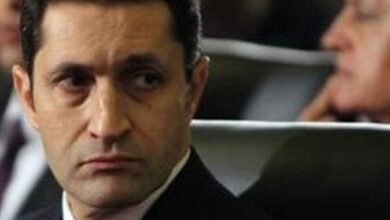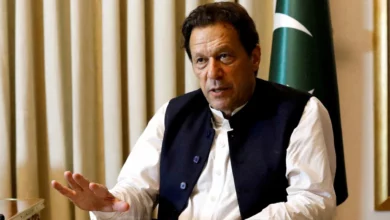The trial of Alaa and Gamal Mubarak, sons of the former president, and seven businessmen accused of insider trading to make illegal gains from the 2007 sale of Al-Watany Bank of Egypt began in a Cairo court today.
For the Mubarak sons, it won’t be the first time they stand up in front of a judge at the Police Academy, where their father was sentenced to life in prison but acquitted of corruption charges alongside the sons. The remaining seven are subject to a travel ban, but not in prison.
The Mubaraks denied all charges of criminal activity.
“This has absolutely no basis in fact. I deny these charges in whole and in their details,” Gamal Mubarak said, according to Reuters.
The question on many minds will be whether this time around the charges of corruption — which, according to the prosecution, include making illegal profits of just over LE2.5 billion — will be proven and charged appropriately. Many are skeptical.
“The question is whether the evidence against the accused is strong and clear enough to convict them. This comes down to the work of the prosecution. But the law is enough to try and punish them. The court proceedings will make it clear what evidence the prosecution has,” said Hegazy El Wakil, a commercial transactions lawyer at Ibrachy & Dermarkar.
Lawyers say Abdel Latif al-Sharnouby, the judge who heads the Public Funds Prosecution and is leading the investigation, is well-respected and knowledgeable of financial issues and the law.
But Wakil believes this Al-Watany bank case is new to Egypt, particularly in its use of investment funds and offshore vehicles to acquire shares and requires specialized knowledge, which he believes the prosecution doesn’t have, especially when compared to lawyers working with the defense.
The others accused include former senior board members of Al-Watany bank, a listed bank at the time, as well as investment banks that were hired as advisers.
Hassan Heikal and Yasser El-Mallawany, the CEOs of EFG Hermes, Egypt’s leading investment bank, also face charges in the case. Mallawany was also a member of the influential policies secretariat of the former ruling National Democratic Party. Gamal Mubarak headed that committee.
Five other senior EFG Hermes and Al-Watany bank figures are charged alongside Heikal, Mallawany and the Mubaraks.
Financial reconciliation
While the accused could face up to 15 years in prison if convicted, some anti-corruption advocates worry that they could evade serious penalties thanks to an amendment to the Investment Law issued by the Supreme Council of the Armed Forces in January. The SCAF’s amendment allows investors with criminal convictions to settle business disputes with the government through financial reconciliation.
The law says investors will only have to pay back the amount they paid for the asset at the time of the sale, rather than any accrued interest.
The Financial Supervisory Authority has refused the request of the accused to settle the case financially. But some say it will ultimately come down to a political decision.
“I think from a political side, they will try to manage the case this way. They might argue over the amount they have to pay, but I think the case may not come up with any other strong results,” said Reda Eissa, an economist and corruption monitor.
Heba Khalil, a researcher at the Egyptian Center for Economic and Social Rights, also said she thinks politics will dictate whether the court allows the defendants to settle through arbitration.
“If they think it will anger people more, they won’t reconcile now,” she said.
Observers say that the timing of the case, announced only a few days before the Mubarak sons were acquitted on separate corruption charges with their father, was a political decision and a way for the court to keep the sons in prison.
“The judges either knew the sons would get acquitted or were taking a precautionary step in case this happened, to keep them under custody. Either way, this is a politicized case. I doubt anyone will be found guilty,” said Osama Mourad, chairman of the Arab Finance Brokerage Company, who also chairs an advisory council on fighting corruption.
The deal
In 2006, Ahmed and Ayman Suleiman, who had controlling stakes in Al-Watany, decided to sell the bank and, prior to announcing this to the public, manipulated its stock price, according to the prosecution.
“Through giving false information to the stock exchange in their monthly disclosure reports about the performance of the bank, they dropped the price of the share from about LE48 to LE10 in the space of six months. Once the price dropped, the businessmen involved bought a large number of shares without disclosing their identity. In the end, the bank was sold for LE74 per share,” said Wakil, the lawyer.
The National Bank of Kuwait is considered to have paid a premium for the bank, which was mostly privately owned and partly listed, according to Amr Alfafly, who used to monitor the bank when he worked as head of research at Egypt’s Commercial International Bank.
The Kuwait bank paid LE5.69 billion for the acquisition, which was 4.16 times book value and 17 times earnings, press reports said at the time. In 2007, the bank made a net profit of LE243.6 million, a 157 percent jump on its 2006 profits.
The high premium the National Bank of Kuwait paid made sense at the time, Alfafy said, given that there was no other way for banks to come into the Egyptian market, except through an acquisition because the central bank wasn’t issuing new licenses.
Wakil said the Egyptian Stock Exchange sets out clear rules about acquisitions, which it permits, if conducted in a transparent manner.
“If you want to buy a controlling stake in a company or bank, you make a request to the Financial Supervisory Authority saying, ‘I want to buy 30 percent of the shares,’ for example. To encourage shareholders to sell to you not on the open market, you say that you’ll buy the share at an increased price of LE31,” Wakil said.
Instead of informing the Financial Supervisory Authority or central bank about their plans to acquire a controlling number of the listed shares, the defendants concealed their identity through cluster companies and personal investment funds based in Cyprus and some of the British Isles, and transferred their profits abroad, a prosecution spokesperson was quoted as saying in Al-Masry Al-Youm.
The funds alleged to have been used to acquire shares opaquely, include EFG Hermes’ Horus funds, which are managed by EFG Hermes Private Equity. The latter was established by the Cyprus-registered Bullion Company, of which Gamal Mubarak owns half and Alaa Mubarak sits on the board, according to an unpublished report by Counter Balance, a European financial watchdog.
“In Cyprus, which is not a great financial center, the all details for funds registered must be announced. This is how we know about Bullion. But we don’t know much about Horus, who is behind it and where does the money go,” Eissa said.
EFG released a statement on 30 May clarifying its relationships with the Mubaraks. It acknowledges Gamal Mubarak’s 18 percent stake in EFG Hermes Private Equity, and two securities trading accounts opened in 2006 to trade shares on the Egyptian Exchange, whose beneficial owners were Alaa and his wife, Heidi Rassekh.
It also says 71 percent of the partners in Horus are Arab governments (35 percent) Arab and Egyptian financial institutions (27 percent), international institutions (9 percent), regional high net worth clients (17 percent) and Egyptian investors (12 percent).
“Thus, it is not owned by the former president’s family,” it said.
EFG Hermes’ shareholders include the governments of Dubai and Abu Dhabi, among others. The company is listed on the Egyptian Exchange and London Stock Exchange.




